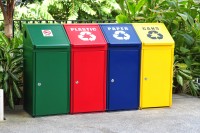When is the last time you asked yourself or someone else if something was recyclable? It a common question and one that gets many different answers depending on what packaging or material you are asking the question about.
Most recycling programs will have information readily available to the public on what they will accept in the recycle bins. This list however is quite small and becomes apparent that what recyclers are looking for is the cream of the crop. If you are anything like me you put everything in the recycle bin and hope that it will motivate recyclers to start taking more material.
People in general want to do the right thing and truthfully speaking it’s a great feeling to know we are doing our part to help recycle when we do make the effort to recycle. I suppose someday recycling will become a mainstream religion – to a very few it already is. I often wonder what recycling would look like if people got paid for their recyclable materials? After all for decades aluminum cans provided a source of additional funds to many and this resulted in very high recycling rates for aluminum cans. It would sure make it a little more worth the effort to sort through and place materials in the proper bin.
The April 1st, 2013 issue of Plastics News had a great Viewpoint article by Don Loepp which addressed this very issue as a discussion point from the March Plastics Recycling Conference in New Orleans.
If we are going to have recycling be a big part of the environmental solution to the growing global plastic pollution issue we are going to have to get aggressive about our recycling efforts and recyclers will need to be a stakeholder in the bigger environmental mission as much as they are with the business focus of recycling. All materials have the potential to be recycled, let involve state and federal programs to bring innovation to the market so that recyclers can accept all materials and have markets to sell those materials.
We’d love to hear what you think?





